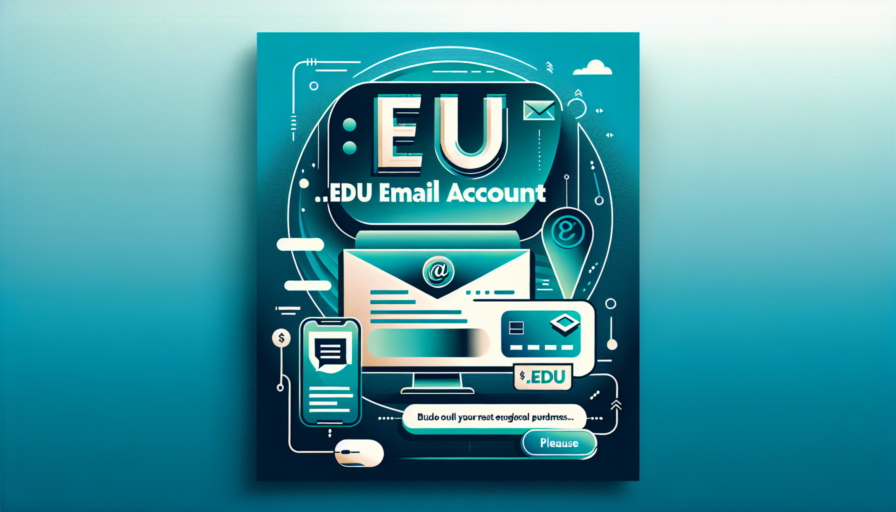
Maximize Your Benefits: How to Secure and Use an EDU Account for Exclusive Deals and Services
February 15, 2024
Ultimate Guide to EDU Email Sign Up: Unlock Student Benefits & Discounts!
February 15, 2024Why You Would Want a Free .EDU Email Address
Within the vast landscape of email domains, the “.edu” extension is a coveted marker indicating affiliation with educational institutions. The allure of a free .EDU email address is not merely in its academic prestige but also in the plethora of benefits it unlocks.
Exclusive Access to Academic Resources: For students, educators, and even alumni, an .edu email address serves as a passport to a world of scholarly databases, online libraries, and academic journals that are often behind paywalls. Accessibility to these resources can significantly enhance the depth and breadth of research capabilities, allowing for a more thorough and informed approach to learning and teaching.
Software and Subscription Discounts: Companies are keen to invest in education and often offer substantial discounts or even free licenses to users with an .edu email. From software giants like Microsoft and Adobe to online course platforms such as Coursera and Lynda.com, the savings one can accrue over time are substantial. Not to mention, these resources can enhance personal, academic, and professional development.
Networking and Communication: Having an .edu email address also means being part of a closed community—a network of peers, educators, and professionals within the academic sphere. This exclusivity facilitates smoother and more credible communication within academia and can lead to opportunities for collaboration, mentorship, and career advancement. The .edu extension carries a level of trust and authenticity that is recognized globally, which can be particularly advantageous when reaching out to experts or participating in academic discussions.
In essence, possessing a free .edu email address is more than owning a slice of digital academic real estate; it’s about embracing a world of possibilities that can enrich one’s educational journey and open doors to a treasure trove of resources and connections.
Eligibility for a Free .EDU Email Address
Obtaining a free .EDU email address is typically reserved for individuals who are affiliated with educational institutions in the United States. Predominantly, these individuals include students, faculty, and staff members at colleges and universities that are recognized and accredited by authorized educational bodies. The .EDU email domain is exclusive because it not only represents the academic affiliation but also grants access to a myriad of educational resources and benefits. To be eligible for a free .EDU email address, one must be enrolled in or employed by a qualifying educational institution.
Students generally gain eligibility for a free .EDU email address upon their enrollment in an accredited institution. Admission to the school often triggers the allocation of the email account, which serves as a primary mode of electronic communication within academia. This email account becomes a vital link between the student and the institution’s administrative departments, professors, and peers. It is also a crucial requirement for accessing online campus resources, submitting academic work, and receiving institution-specific updates and notifications.
Similarly, faculty and staff members are eligible for an .EDU email address as part of their employment benefits. These accounts are issued to streamline communication, schedule meetings, share academic materials, and facilitate collaboration on institutional platforms. It is important to note, however, that adjunct faculty or part-time staff might face different eligibility criteria, which vary by institution. As part of their employment verification process, faculty and staff normally receive their .EDU email addresses through the human resources or IT departments of the educational institution.
Eligibility criteria can extend to other groups associated with educational institutions in certain cases. For example, research fellows, visiting scholars, and alumni may also be entitled to a .EDU email account depending upon institutional policies. These exceptions are typically case-specific and those interested should check with the respective institution’s IT or administrative office for precise eligibility details. Furthermore, educational institutions have developed stringent policies to protect the integrity of their .EDU domain, and as such, they maintain the right to revoke access to the email address if a user no longer meets the eligibility criteria.
Legitimate Methods to Get a Free .EDU Email Address
As many of us seek to gain access to the wide array of benefits that .EDU email addresses offer, from software discounts to educational resources, we must highlight the legitimate routes to obtain one. These methods, though limited, ensure compliance with regulations and offer a sustainable path to enjoying the privileges that come with .EDU emails.
Enrolling in Community Colleges can be a practical step for obtaining a .EDU email address. Many community colleges in the United States provide .EDU email accounts to their students upon registration for classes or even for those taking non-credit community courses. While each institution has its own policies, you often do not need to be a full-time student to qualify. Researching local community college offerings and making inquiries can reveal no-cost or low-cost options that provide educational value along with the coveted email extension.
Another avenue is through Online Education Programs that are affiliated with universities or colleges. These programs may offer .EDU emails as a part of their learning platform, especially for courses that grant certificates or credits. Before enrolling in such programs, confirm that they do indeed provide .EDU email addresses and check if there are any specific requirements to fulfill in order to obtain one.
For educators and academic researchers, participating in University Affiliates or Extension Programs often yields a university-branded .EDU email. These programs typically target professionals in the field of education or research and may include professional development courses or collaborative projects with educational institutions. By contributing to these programs, participants not only expand their professional expertise but also gain legitimate .EDU email addresses.
It is important to remember that while the allure of a .EDU email address is strong due to the perks it offers, the methods mentioned above are meant to underscore the importance of following legitimate and ethical practices to obtain them. Engaging with educational institutions through genuine interest in learning and professional development not only secures you an .EDU email but also enriches your personal and professional growth.
Step-by-Step Guide to Register for a Free .EDU Email
Having a .EDU email address not only reflects your association with an educational institution but also provides numerous perks including software discounts, access to online libraries, and much more. Registering for a free .EDU email might seem to be a daunting task, but by following this simple step-by-step guide, students can easily acquire their own .EDU email address and begin enjoying the benefits that come along with it.
Eligibility Check and Preparing Necessary Information
First and foremost, determine if you are eligible for a free .EDU email address. Generally, these addresses are granted to students who are enrolled in colleges and universities. Gather all necessary documentation such as a student ID, admission confirmation, or enrollment records, as these will be required during the sign-up process. It’s important to note that not every institution offers a free .EDU email, so verify with your school’s administration or check their website for more details.
Visiting Your Institution’s Email Sign-up Page
Once your eligibility is confirmed, the next step is to visit your institution’s dedicated email registration page. This can typically be found on the school’s website, often within the ‘Current Students’ or ‘IT Services’ section. If you’re unable to locate it, don’t hesitate to contact the IT helpdesk for assistance. Follow the on-screen instructions carefully, as procedures can vary between institutions. If prompted, agree to the terms and conditions to proceed further.
Completing the Registration Process
During the registration process, you’ll be asked to fill in personal details such as your name, student ID number, and sometimes additional information like your birth date or social security number. Ensure that you enter all the required information correctly to avoid any issues with your application. After submitting the form, you’ll likely receive an email to your personal account to verify your identity. Click on the provided link to confirm your registration. Upon successful verification, your institution will usually send a second email containing your new .EDU email address and a temporary password.
Remember to change your temporary password upon first logging into your new .EDU email account to secure your personal information. Often, you might also need to set up security questions or provide an alternative email address for account recovery purposes.
Frequently Asked Questions About Free .EDU Emails
What Are the Benefits of Having a .EDU Email Address?
One of the most common questions regarding .EDU email accounts is about their benefits. .EDU emails are exclusive to educational institutions, and with them, students and faculty members can take advantage of a range of academic discounts, free access to software, and library privileges. These email addresses often serve as a gateway to databases, journals, and subscription services that would otherwise come at a significant cost. Furthermore, an .EDU email may add a level of credibility to academic communications and professional environments that recognize the unique status of educational affiliates.
How Can One Obtain a Free .EDU Email Address?
Typically, free .EDU email addresses are granted by colleges and universities to their students, faculty, and sometimes alumni. Enrollment or employment at an educational institution is a prerequisite for obtaining such an email address. In some cases, online courses or community colleges offer .EDU emails as part of their enrollment package. It’s imperative to check with the respective educational institution for the specific criteria and process for obtaining a .EDU email.
Are There Any Security Concerns With .EDU Email Accounts?
As with any email service, security should always be a concern. Educational institutions often provide robust security measures to protect their users’ .EDU email accounts. However, users should be aware that phishing attempts and spam are still common risks. It’s crucial for users to employ strong passwords, two-factor authentication where available, and remain vigilant about the kind of information they share through their .EDU email accounts. Maintenance of good digital hygiene is a shared responsibility between the email service provider and the user.
Is It Possible to Keep Your .EDU Email After Graduation?
Many individuals may wonder if their .EDU email addresses expire upon graduation or leaving the educational institution. This varies by institution; some may allow graduates to maintain their .EDU email accounts indefinitely as a form of alumni engagement, while others may deactivate accounts after a certain period post-graduation. It’s advised to consult your institution’s email policy or alumni office for accurate information. For those permitted to retain their .EDU emails, it remains a valuable asset for continuing to access alumni resources and discounts.







